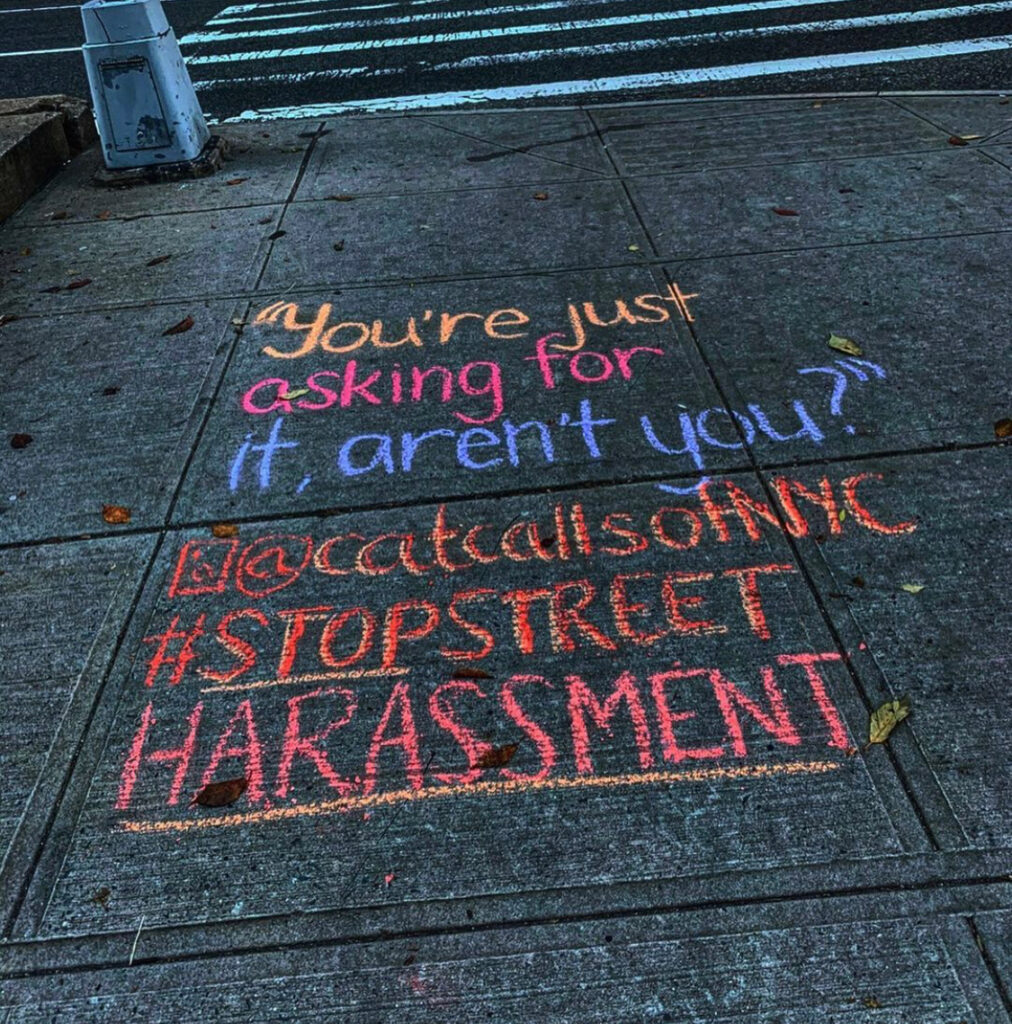I was first catcalled at age 12. I was confused and uncomfortable when older men began looking at me and speaking to me with sexual undertones. I thought I must have been doing something to provoke the behavior. This idea —that my preteen body was provocative— was something I learned at school. When I wore my stylish ripped tights or off-the-shoulder top, my classmates called me “slutty,” and my teachers labeled my outfits inappropriate.
It wasn’t until I became immersed in anti-street harassment activism that I understood catcalling and other forms of sexual harassment were not my fault. In 2016, I started writing word-for-word catcalls along with #StopStreetHarassment on the streets with chalk where they happened, and posting them on Instagram at @Catcalls of NYC. Via DM, girls and women shared experiences of being sexualized, followed, touched and harassed on the street. Many stories illustrated the disproportionate burden faced by women of color, trans and nonbinary people, and disabled women facing hateful harassment due to multiple facets of their identity. The messages explained the harmful impact of street harassment, and importantly, the healing aspect of sharing their story. The stories showed that harassment had nothing to do with what someone was wearing, and everything to do with power.
In late 2017, the #MeToo Movement, started by Tarana Burke, went viral on Twitter. There was a newfound cultural focus on sexual harassment, and consequently, news outlets around the world covered the story of Catcalls of NYC. The Instagram account gained tens of thousands of followers overnight, and my inbox accumulated hundreds of stories. The idea of writing catcalls on the street resonated widely, with dozens of global outposts popping up. Activists started Instagram accounts, including Catcalls of Ottawa, Catcalls of Kenya, Catcalls of Berlin, Catcalls of Cairo, Catcalls of DR… and many more.
Six years later, Chalk Back is a powerful youth-led movement of girls, young women, LGBTQIA+ folks, and BIPOC folks on six continents combating street harassment. It is a grassroots movement, co-created by those who are most harshly impacted by the issue of street harassment globally. Documenting stories of harassment with chalk and social media provides accessible ways for young activists to take back power and become fervent advocates. Our goal is to shift the culture, and it’s working. Chalk Back members have appeared on live TV , given TedTalks, become international human rights honorees, and most of all, continued their work without any outside recognition and despite frequent backlash.
Chalk Back adopts an intersectional and international approach to our advocacy and movement-building efforts. We focus on street harassment within the framework of oppressive structures. We analyze current events, such as the rise in transphobic and homophobic laws, book bans, incidents of racist police violence, and abortion restrictions in the US. On the global scale, we’ve seen and stood up against the recent Ugandan law making “aggravated homosexuality” punishable by death, the execution of protesters in Iran, and countless other human rights violations. In the face of this rising tide of gendered and racialized violence, Chalk Back builds global solidarity using chalk and Instagram. Creating a space and a way for community members to speak about these issues is a powerful way to advocate for all people who are discriminated against, harassed, assaulted, or criminalized in public space.
Activism can be a challenging journey, as we often negotiate harmful ideologies, shared and individual traumas, mental health challenges, and lack of resources. As a community, we inspire each other and so many folks who experience harassment to keep fighting back against it. Our voices are so powerful together.
Join us.
Bio: Sophie Sandberg is an activist, educator, and street artist combating gender-based violence. She created the popular initiative, Catcalls of NYC, which raises awareness about street harassment using colorful chalk art and co-leads Chalk Back, a global youth-led movement against street harassment. Sophie’s work with Chalk Back has been featured in international media including New York Times, BBC, CNN, The Independent, Forbes, Vanity Fair, and NBC. She has worked on campaigns with Plan International and the UN Girls Education Initiative. She has a Bachelors of Arts from New York University in Gender and Sexuality Studies and is currently pursuing her Masters degree in Arts Politics. Find out more about Chalk Back on Instagram at www.instagram.com/catcallsofnyc and at www.chalkback.org.
